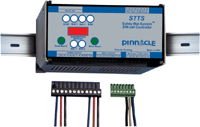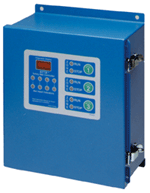Mat
Controller
Diverse Redundancy Design Concept—The STTS Mat Controllers utilize the diverse redundancy design concept. This gives the mat system a higher level of redundancy and control reliability. The two microprocessors are of different design, and the microprocessor or parallel programs are programmed from different instruction sets written by different programmers. Redundant Captive Contact Safety Relays—Redundant relays assure safety should an output relay fail. The STTS Mat Controller utilizes safety relays which have force-guided contacts. This is a configuration where the contacts are mechanically locked together so if one set of contacts weld, the other contacts cannot change state. Alphanumeric Diagnostic Message Display—Scrolling message display shows status and fault codes. This is an excellent safety and maintenance feature unparalleled in the machine guarding industry for increasing uptime. Circuit Description—Low voltage DC signal (+/- 20VDC) is pulsed to the mat simulating a 24VAC signal through two wires. The wires are attached to the top and bottom electrodes (internally) of the mat. Force on the mat lowers the resistance between the two wires causing a drop in voltage. A second pair of wires coming back from the mat is used to sense this drop in voltage. The redundant circuits compare the voltage to a reference and shut down the zone when the voltage drops below the reference. The circuit goes through a self-check to verify that the reference, comparators, mat, wiring, and other circuits are all functioning normally every time it scans a mat input. Diverse redundant technology, provided by two different computers, controls the whole system and provides a higher level of safety and system flexibility. The following standard provisions are designed into both mat controllers to facilitate the guarding system interface and monitoring desired (usage is optional): External Relay Check
Provision—The External Relay Check allows the STTS
Mat Controller to monitor a pair of external relays in
series using the external relays secondary set of DRY
contacts, provided they are N.C. force-guided contacts.
The captive or force-guided contacts will maintain the
identical position as the primary set of contacts on the
external relays, except the secondary set of contacts are
wired to signal the reverse of the primary (i.e., primary
contacts are N.O. and secondary contacts are N.C.). The
circuit looks for both closing and opening of the
external relay contacts. The STTS Mat Controller provides
a safe external relay check. Auxiliary Output Contact
Provision—The Auxiliary Output contact provides a
N.O. or N.C. isolated (DRY) contact output to signal the
condition of the mat system. The output is used in
conjunction with the standard pair of output relays that
are wired to the safety circuit of the equipment.
DeviceNET™Complete system monitoring on DeviceNET™ fieldbus networks. The STTS Mat Controller family if fully compatible with the DeviceNET™ fieldbus and can be connected directly into the fieldbus for non-safety monitoring of system status. DeviceNet™ is the leading low cost communications link that connects a wide range of automated manufacturing devices for greater usability and convenience. Multiple STTS Mat Controllers can be networked with numerous other devices on a single DeviceNet™ network. Add suffix DN to controller part number for this optional feature. |






